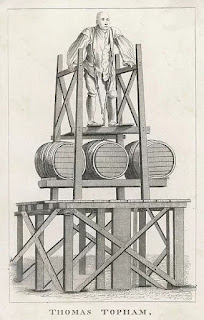Women were called upon to sustain the war effort at home. The LGOC went on to employ over 3,500 women from 1916 as bus conductors sometimes referred to as ‘conductorettes’.
Florence Cordell photographed in 1916 as an LGOC Bus Conductor
Florence Cordell photographed showing her waybill to the inspector. A waybill is a list showing passengers or goods being transported on a vehicle.
The women had to undergo a medical and take an arithmetic test to ensure they could calculate the fares and give the correct change. If successful, the applicants proceeded to a two-week training course. Training concluded with an oral and written examination.
Florence Cordell was a Londoner, who’d left school at the age of fourteen to work in a lampshade factory. With the war leading to
a down-turn in trade and work prospects, Florence began to look for war work instead.
Aged 21, Florence applied to work on the Underground, but Florence was turned down for not being tall enough Instead she applied to be bus conductor with the London General Omnibus Company and was readily accepted.
To start with, Florence worked as a spare. It was essential that the
buses left the depot on time and if someone didn’t turn up, a spare
had to be ready to take their place.
She quickly had to learn how to run her thumb over the surface of the coin before accepting it for bus fares especially during the blackouts where there would be no light on top of the open bus. This is when people tried to pay a less amount or pretend to pay more so they could receive their change back.
If when you banked your money at the end of each shift and it was less then what it should be. The ‘unders and overs’ list as it was referred to would be checked the next day. Then the difference would be taken out of your wages.
Once Florence was assigned a route, she received a regular income and was paid the same as the male conductors. It was only later on, when the bus company proposed paying the women five shillings a week less for the same work as the men, that the transport workers, both male and female, went on strike in 1918.
Being a bus conductor gave Florence financial independence and a sense of pride, but it came to an end in 1919. She had married during the war and reverted to the pre-war life that a married woman did not work unless her husband was very poorly paid and she really had to.



